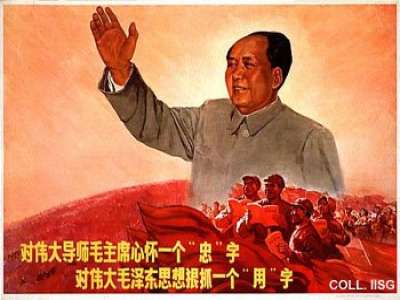|
Suh Teacher was discussing a particular Korean word, “훌륭하다”. This word means “excellent; stately; honorable; respectable; commendable; admirable; praiseworthy.” Listening were the students of our class, 15 in all — thirteen from China, one Chinese-Malaysian, and me. To make sure students understood how to use the word, Suh Teacher asked, “Okay, then, for whom can we use this word? Examples?” It was an open question to the room.
|
|
Very quickly came a girl’s exclamation: “Mao Zedong!” (something like “Mao Dzhuh-doong” in Korean, which follows Chinese pronunciation, I suppose). The class did what it often does, which is to laugh in unison. (When these spontaneous eruptions happen, it always seems as if they’d been planned. It hadn’t been “planned”; there is just a Chinese Consensus in the room.) (The concept of “Chinese Consensus” has occurred to me before in classes, so I’ll capitalize it here so as to dignify it with an implied existence.)
I wondered why they were laughing. |
|
My impression, from the many Chinese whom I’ve met while studying Korean, is that they really do like that man. At the same time, maybe most are aware enough to know that Chairman Mao, revered back in China down to the present day as he may be, is something of an enemy figure to South Koreans, certainly to older ones. He sent a million men to try to quash the existence of the Republic of Korea in 1950, after all. Hence the awkward laugh. This is my best explanation.
As the Chinese Consensus’ laugh was ebbing past its peak, something completely unexpected happened. My favorite of the thirteen Chinese, J.G., a male about 20 years old, a voracious coffee drinker and always in good humor, exclaimed “아니요!” (“No!”). It was the first thing anyone had said since Mao was suggested as an “admirable, praiseworthy” figure a moment earlier. J.G. was animated. Along with his “No!”, he did some kind of motion akin to humorously slamming the desk. It’s not clear to me to what extent he was joking. But he then — and this really was shocking to me — apparently suggested an alternative “admirable figure” in the person of Chiang Kai-Shek, the founder of Taiwan, arch anti-Communist, arch-enemy of Mao Zedong. The teacher asked if this is who he’d meant. “대만을 만든 사람?” (“The person who ‘made’ Taiwan?”). “Yes”, J.G. said. There was no counter-reaction. The Consensus disintegrated into disorganized giggles and confusion. The teacher moved on. |

